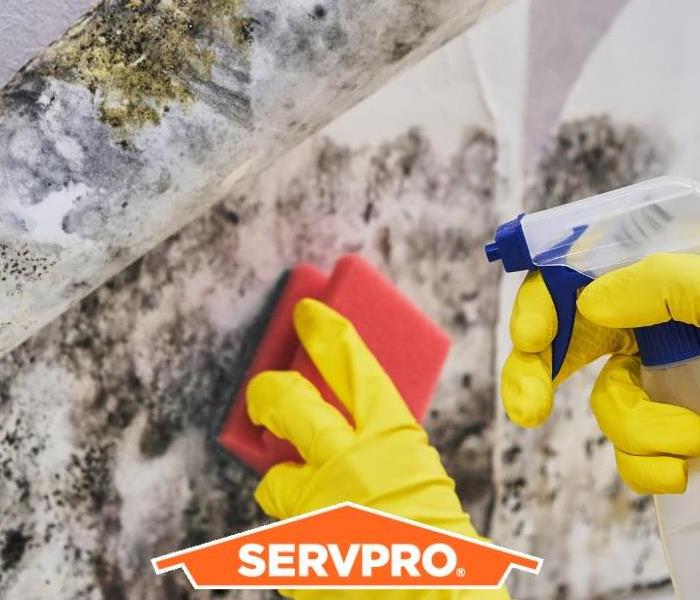Why You Shouldn’t DIY Mold Cleanup
7/28/2023 (Permalink)
Mold can be extremely dangerous and hazardous to your health. Depending on the type of mold spores you have in your home, determines whether or not it's dangerous to be near or touch. However, if you're not familiar with the types of mold, it's best that you don't go near it and try any of those Pinterest DIY mold removal hacks.
SERVPRO of West Somerset County is here to explain the mold types, talk about why you should not DIY the remediation, and let you in on how we can help.
Why You Shouldn't Remediate on Your Own
If you find mold in your home, don't just put on gloves, grab a bottle of chlorine bleach, and start scrubbing. By attempting to remove the mold on your own, there's a large chance that you can release thousands of mold spores into the air. After this happens, they'll likely land on surfaces where there wasn't mold growth, contaminating the new areas.
Not only does this spread mold spores throughout the walls of your home, but you're now putting yourself as well as your family at risk by ingesting it. DIY mold removal is never a good idea and can cause many health problems for you and everyone living in your home or business down the road.
Also, if you're choosing a more potent chemical to attempt to remove mold, you're now dealing with breathing in toxic fumes along with the mold. We suggest, as soon as you see or smell any kind of sign of mold in your home, call a professional ASAP.
You Should Understand Mold
Microscopic mold spores exist almost everywhere including indoors and outdoors. So, it makes it impossible to remove all mold from a home or business. Many restoration professionals and businesses will advertise "mold removal," and will guarantee to remove all mold, which is false advertising.
We think it's important for all homeowners and business owners to understand as much as possible about mold:
- Mold is present almost everywhere.
- Mold can float along in the air and may enter your home through windows, doors, AC/heating systems, and can even hitch a ride on your clothing or pets.
- Mold thrives on moisture and can grow quickly into colonies when exposed to water.
- Before mold remediation can begin, any sources of water or moisture must be addressed.
- Mold often produces a strong, musty odor.
- Even higher-than-normal indoor humidity can support the growth of mold.
Our Mold Remediation Process
We understand that all mold damage scenarios are different and require a unique, non-cookie-cutter solution. However, the general mold remediation process stays the same:
- Once you get any type of sign of mold, call us (732) 201-8872.
- We'll complete an inspection and mold damage assessment.
- Next, we'll contain the mold.
- We'll filter the air with our equipment.
- We'll remove the mold and mold-infested materials.
- We can also clean contents and belongings that have been exposed.
- Lastly, we'll complete the restoration.
We provide professional proper cleaning to kill mold, as well as restore water damaged areas. If you have a moisture problem, we can help with that as well - as this is probably the main source of your mold problems.
What is Black Mold?
This type of mold is also known as "stachybotrys chartarum." It produces allergens and irritants, however, most types of mold can produce this. Since many types of mold can cause reactions, you should contact us regardless of the color or type of mold. In many instances, multiple types of mold may exist in the same house or structure, so if you suspect any type of mold, contact us right away.
DIY mold removal is never the way.
About SERVPRO Team Harvey
SERVPRO of West Somerset County is proudly owned by Lance and Jennifer Harvey - a husband and wife duo that owns three other SERVPRO locations, including SERVPRO of Lower Manhattan, SERVPRO of Hoboken/Union City, and SERVPRO of Aberdeen/Holmdel.
We understand the stress and worry that comes with a fire or water damage and the disruption it causes your home or business. Our goal is to help minimize the interruption to your life and quickly make it “like it never even happened.”





 24/7 Emergency Service
24/7 Emergency Service
